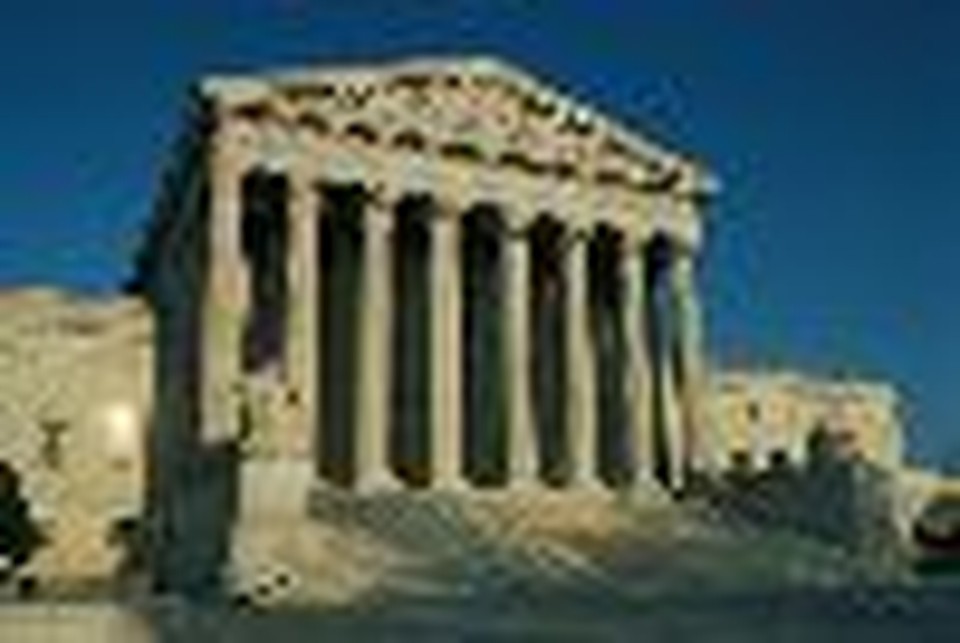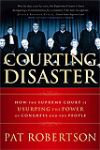Courting Disaster: How the Supreme Court is Ursurpsing Power

Surely philosopher Lord Acton was right when he said that power corrupts and that absolute power corrupts absolutely. There is no better proof of those words than the distortion of justice and the radicalization of the courts that has taken place in this country during the past fifty years.
The purpose of the courts, as the founders made clear, is to ensure that justice prevails in the land. The U.S. Constitution begins with these words: “We the people of the United States, in order to form a more perfect union, establish justice, insure domestic tranquility, provide for the common defense, promote the general welfare, and secure the blessings of liberty to ourselves and our posterity, do ordain and establish this Constitution for the United States of America.”
It is no accident that, second only to the formation of the Union, justice was foremost in the thoughts of the men who built this nation. They knew, in fact, that domestic tranquility, the common defense, and the general welfare could only be assured if justice were first established. Under their British colonial masters, the early Americans came to appreciate the true meaning of justice before the law. Even earlier, in Europe, their ancestors had suffered intolerance and persecution. The law that served the Crown was harsh and unjust to the common citizen, and judges were subject to bribes and treachery of every kind. The law was certainly no friend to men and women of an independent mind, and the founders of this new republic set out from the very beginning to create a system where justice would prevail.
With such a history, it is easy to understand why the framers of the Constitution so highly prized law and order. The formation of the federal judiciary was a central concern.
Nevertheless, the courts were designed to administer law, not to make it. The division of the national government into three branches—executive, legislative, and judicial—was an inspired innovation of the framers. They built into our constitutional apparatus a system of checks and balances to ensure that no single branch of government would be able to steamroll the others. Individuals chosen to serve on the bench, whether appointed or elected, whether federal or local, were to be faithful interpreters of the law. They were students of the law, with no legislative or executive functions.
Judges at all levels were expected to be experienced in jurisprudence. They were to be moral, above suspicion, circumspect in their personal behavior, highly disciplined, and defenders of the common good. They were empowered to settle disputes and to resolve matters of controversy according to known and currently existing standards of justice.
As such, justices of the Supreme Court and judges in each of the inferior courts across the land would be dependent upon the executive and legislative branches—equal to them in their constitutional responsibilities but subject always to “the will of the people.”
As Alexander Hamilton expressed in Federalist 78:
The judiciary, from the nature of its functions, will always be the least dangerous to the political rights of the Constitution; because it will be least in a capacity to annoy or injure them. The Executive not only dispenses the honors, but holds the sword of the community. The legislature not only commands the purse, but prescribes the rules by which the duties and rights of every citizen are to be regulated. The judiciary, on the contrary, has no influence over either the sword or the purse; no direction either of the strength or of the wealth of the society; and can take no active resolution whatever.
It may truly be said to have neither force nor will, but merely judgment; and must ultimately depend upon the aid of the executive arm even for the efficacy of its judgments.
Then, with a passing reference to Baron de Montesquieu’s work The Spirit of the Laws, Hamilton adds that “the judiciary is beyond comparison the weakest of the three departments of power.” In short, the authority of the courts emanates from the lawmaking branches. Judges were never expected to take the liberties they’ve taken in recent years. Justices were never meant to be a power unto themselves. Yet, over time, their role has changed.
During Good Behavior
To appreciate just how much the role of the courts has changed, it will be helpful to recall briefly the manner by which the founders established our nation’s judiciary. In Article III, Section 1 of the Constitution, we read:
The judicial power of the United States, shall be vested in one Supreme Court, and in such inferior courts as the Congress may from time to time ordain and establish. The judges, both of the supreme and inferior courts, shall hold their offices during good behaviour, and shall, at stated times, receive for their services, a compensation, which shall not be diminished during their continuance in office.
It was the duty of Congress to establish the Supreme Court and, through the appointment authority of the president, to see that justices were chosen to serve the people. Justices of the Supreme Court were to have a high degree of freedom and job security. They were to have life tenure and a secure income, ensuring their independence from threats or undue influence.
Nevertheless, the tenure of any Supreme Court justice was secure only so long as he or she maintained “good behaviour.” On this point, Alexander Hamilton says that the precondition of good behavior is “the best expedient which can be devised in any government, to secure a steady, upright, and impartial administration of the laws.” In other words, knowing that his or her actions on the bench would be under scrutiny by the other branches, as well as by the American people (who are superior in our republican form of government), would help to prevent arbitrary and improper judgments by the members of the Court.
Unlike Europe, where judges were subject only to the whims of king and Parliament, in America the people have a voice, and behavior by any justice outside the bounds of his legitimate role and authority may be grounds for impeachment.
Despite this threat, however, the courts have chosen a very different course. Through systematic reinterpretation and misreading of the Constitution, by disregarding the will of the people in dozens of politically charged cases, and by attempting to enshrine their own liberal notions of “social justice” through tortured readings of the law, justices have substantially changed the form and substance of our American democracy-and have repeatedly distorted the true meaning of the Constitution.
The imbalances in the courts have placed the principle of checks and balances at risk and, in effect, handed over the government of this country to what many observers of the Court now refer to as an “imperial judiciary” and a “judicial oligarchy.” Thomas Jefferson once warned that the tendency “to consider the judges as the ultimate arbiters of all constitutional questions” is “a very dangerous doctrine indeed, and one which would place us under the despotism of an oligarchy.” We all ought to share his concern.

Click here to visit the Courting Disaster ACTION website.
You can visit Pat Robertson's website here.
Originally published October 27, 2004.




